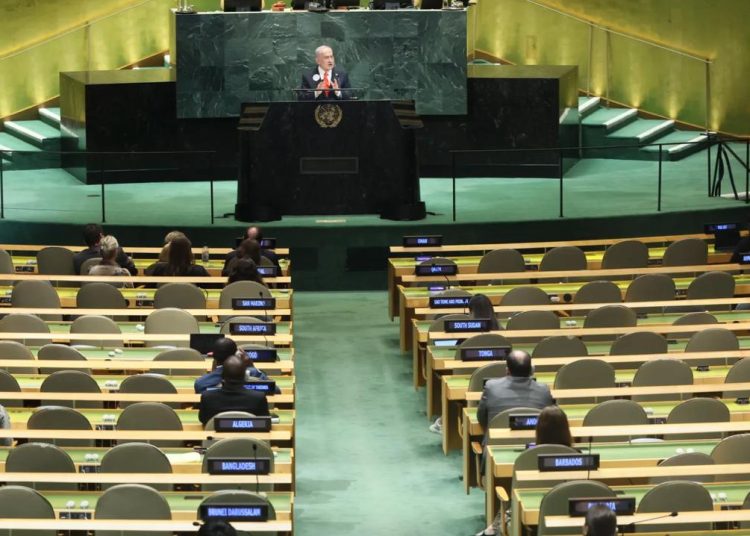The grand hall of the United Nations General Assembly, a chamber designed for the convergence of global voices, became the stage for a powerful silent protest on September 26, 2025. As Israeli Prime Minister Benjamin Netanyahu approached the iconic green marble podium, a quiet but momentous exodus occurred. In an act of dissent, scores of diplomats and representatives from dozens of nations rose from their seats and filed out, leaving vast sections of the hall conspicuously empty. The subsequent address was delivered not to a full assembly of world leaders, but to a sparse audience of staunchest allies and the echoing silence of a world turning its back.
This mass walkout was not a spontaneous outburst but a resounding diplomatic rebuke, underscoring Israel’s deepening isolation on the world stage. It served as a stark, visual metaphor for a foreign policy that, in the eyes of many, has alienated partners, defied international consensus, and exhausted diplomatic patience. The central theme was undeniable: the empty seats delivered a more potent message than the words being spoken from the podium.
Prime Minister Netanyahu’s 2025 address did not happen in a vacuum. It came on the heels of a tumultuous year that saw several critical developments:
- Gaza Genocide and “Total Victory” Doctrine: Throughout 2025, Israel continued its genocide in Gaza under the banner of “total victory.” Despite mounting international pressure, UN resolutions, and an ICJ ruling demanding a cessation of mass killings and unimpeded humanitarian access, the Netanyahu government persisted. This unwavering stance, was a primary catalyst for the protest.
- Annexation Policies and West Bank Tensions: The expansion of settlements in the occupied West Bank and rhetoric from far-right elements within Netanyahu’s coalition government suggesting formal annexation have been met with widespread condemnation.
- Confrontation with Iran: Following the Israeli aggression on Iran in June 2025, which drew strong condemnation at the international community, regional tensions soared. While Netanyahu framed these actions as necessary for Israeli security, many nations viewed them as reckless adventurism, warmongering and escalations that risked a wider, catastrophic war, undertaken without sufficient regard for regional stability. The escalation, has not been limited to Iran, but has included other regional countries including Qatar, Lebanon, Syria, and Yemen.
- Erosion of Diplomatic Support: European states, while remaining key allies, have shown increasing public friction with Netanyahu’s government, issuing sharper rebukes. European nations, once divided, have found greater unity in their criticism of Israeli policy, with several moving towards recognizing a Palestinian state – a move Netanyahu vehemently opposes.
The Walkout: A Global Message
The protest was significant not just for its size, but for its breadth. It included not only the expected Arab and Muslim-majority nations but also a substantial number of countries from the Global South (across Latin America, Africa, and Asia) and, crucially, several European nations. This broad coalition transformed the act from a regional grievance into a global verdict.
Netanyahu’s Address: A Speech for a Different Audience
Seemingly undeterred by the sea of empty chairs, Netanyahu delivered a defiant speech that was clearly aimed not at the international community before him, but at his domestic political base and his staunchest supporters in the United States.
While his words may have resonated with his base, in the context of the UNGA hall, they sounded like a monologue in an echo chamber. The message of defiance, intended to project strength, instead highlighted his government’s inability to engage constructively with the world.
Analysis and Implications: A Tipping Point
The 2025 UNGA walkout represents a significant diplomatic tipping point.
- The Failure of a Strategy: It demonstrates the ultimate failure of Netanyahu’s long-standing strategy of bypassing multilateral forums in favor of direct, transactional relationships, primarily with the United States. As global power dynamics shift, this approach has proven unsustainable.
- Visualizing Isolation: In the age of social media and instant visual communication, the image of hundreds of empty seats is a powerful political symbol that is difficult to counter with rhetoric alone. It provides a tangible, easily understood metric of Israel’s isolation.
- Empowering Opposition: The event is likely to embolden both international and domestic opposition to Netanyahu’s government. It signals that the diplomatic cost of his policies has become untenably high, potentially creating rifts even within his own security establishment and political landscape.






